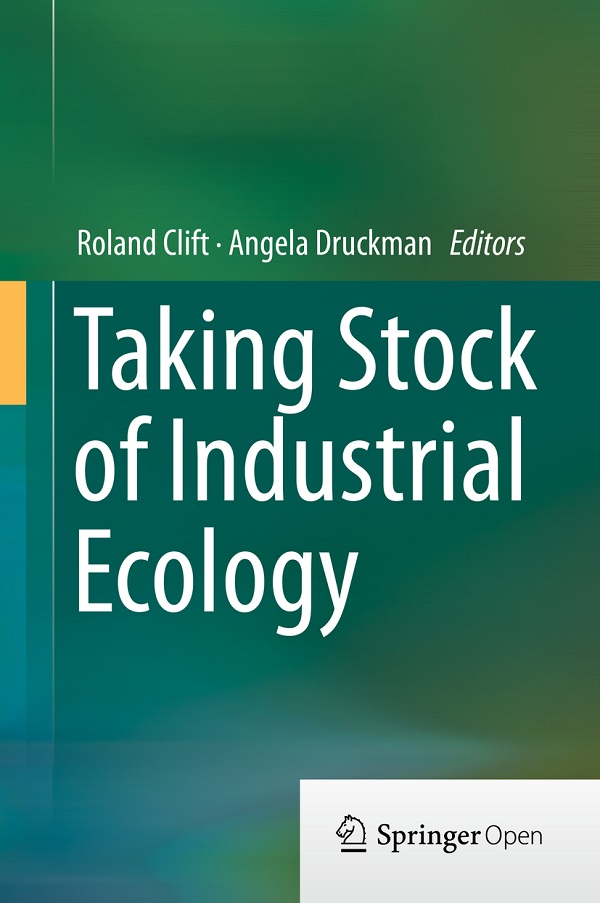
Title
Taking Stock of Industrial Ecology
Size
362 pages
Language
English
Released
2016
ISBN
978-3-319-20570-0
Published by
Springer International Publishing
Book Info
See Book Availability at Library
Japanese Page
“Taking Stock” in the book title is a synonym for “inventory,” and in this case, it means an overview of the progress of an emerging academic field. The term “industrial ecology” is not popular in Japan, and not easy to translate to Japanese. The term, “Sangyo ecology”, a combination of the Japanese translation of “industry” and the English term “ecology,” is often used. Like ecology, the study of the relations and interactions between organisms and their environment, industrial ecology is the study of the relations and interactions between industries and their environment. Particular attention has been paid to the exchange of materials and energy between production processes in industries. The starting point of the discipline involves an adaptation of analogies with biological interactions and metabolism, such as food chain within ecosystems, aimed at making industrial activities more sustainable. Inherently, industrial ecology is a multi- and inter- disciplinary field of research, involving environmental engineering and environmental science, as well as, the social sciences, including economics, management, and policy science.
Industrial ecology is a new field of study, and its progress with this title originated from the United States in the 1990s. Then, in Europe, graduate education with this title commenced. Publication of an international peer-reviewed journal and the establishment of an international society accelerated the global spread of this field of research. This book provides an overview of industrial ecology, including the history and definition of the research field in the introductory chapter, as well as, concrete studies in the remaining chapters. This book was edited by Prof. Roland Clift and his colleague, Angela Druckman, of Surry University, U.K., when they hosted the 2015 biennial conference of the ISIE (International Society of Industrial Ecology), which was established in 2001. The book consists of a total of 19 chapters divided into Part I, which covers the state-of-the-art and discussions on research issues, and Part II, covering case studies and examples of industrial ecological approaches and applications. It is also published as an open-access e-book, i.e., all the contents are accessible online without charge.
The author of this introduction co-authored chapter 12 on material flow analysis and waste management with Prof. Seiji Hashimoto of Ritsumeikan University. MFA (Material Flow Analysis)is one of the key methodologies in industrial ecology, which quantifies the flow of resources, products, waste, and specific elements contained in them. As recycling, which re-utilizes waste as a resource, emerges, systematic understanding of material flow can provide fundamental information for recycling and sound waste management.
Recently, Sound Material Cycle Society (or Circular Society) in Japan and Circular Economy in Europe and China are used as keywords for transforming mass-production, mass-consumption, and mass-disposal societies to more sustainable socio-economic systems. Methodological development and case studies by MFA and other industrial ecology studies contribute to concrete pathways towards such socio-economic systems.
(Written by Yuichi Moriguchi, Professor, School of Engineering / 2019)
Table of Contents
Part I State-of-the-Art and Discussions of Research Issues
1 Industrial Ecology’s First Decade (T. E. Graedel and R. J. Lifset)
2 Prospective Models of Society’s Future Metabolism: What Industrial Ecology Has to Contribute (Stefan Pauliuk and Edgar G. Hertwich)
3 Life Cycle Sustainability Assessment: What Is It and What Are Its Challenges? (Jeroen Guinée)
4 Industrial Ecology and Cities (Christopher A. Kennedy)
5 Scholarship and Practice in Industrial Symbiosis: 1989–2014 (Marian Chertow and Jooyoung Park)
6 A Socio-economic Metabolism Approach to Sustainable Development and Climate Change Mitigation (Timothy M. Baynes and Daniel B. Müller)
7 Stocks and Flows in the Performance Economy (Walter R. Stahel and Roland Clift)
8 Impacts Embodied in Global Trade Flows (Thomas Wiedmann)
9 Understanding Households as Drivers of Carbon Emissions (Angela Druckman and Tim Jackson)
10 The Social and Solidarity Economy: Why Is It Relevant to Industrial Ecology? (Marlyne Sahakian)
11 Industrial Ecology in Developing Countries (Megha Shenoy)
12 Material Flow Analysis and Waste Management (Yuichi Moriguchi and Seiji Hashimoto)
Part II Case Studies and Examples of the Application of Industrial Ecology Approaches
13 Circular Economy and the Policy Landscape in the UK (Julie Hill)
14 Industrial Ecology and Portugal’s National Waste Plans (Paulo Ferrão, António Lorena, and Paulo Ribeiro)
15 The Role of Science in Shaping Sustainable Business: Unilever Case Study (Sarah Sim, Henry King, and Edward Price)
16 Practical Implications of Product-Based Environmental Legislation (Kieren Mayers)
17 Multinational Corporations and the Circular Economy: How Hewlett Packard Scales Innovation and Technology in Its Global Supply Chain (Kirstie McIntyre and John A. Ortiz)
18 The Industrial Ecology of the Automobile (Roland Geyer)
19 Quantifying the Potential of Industrial Symbiosis: The LOCIMAP Project, with Applications in the Humber Region (Malcolm Bailey and Andrew Gadd)



 Find a book
Find a book


 eBook
eBook